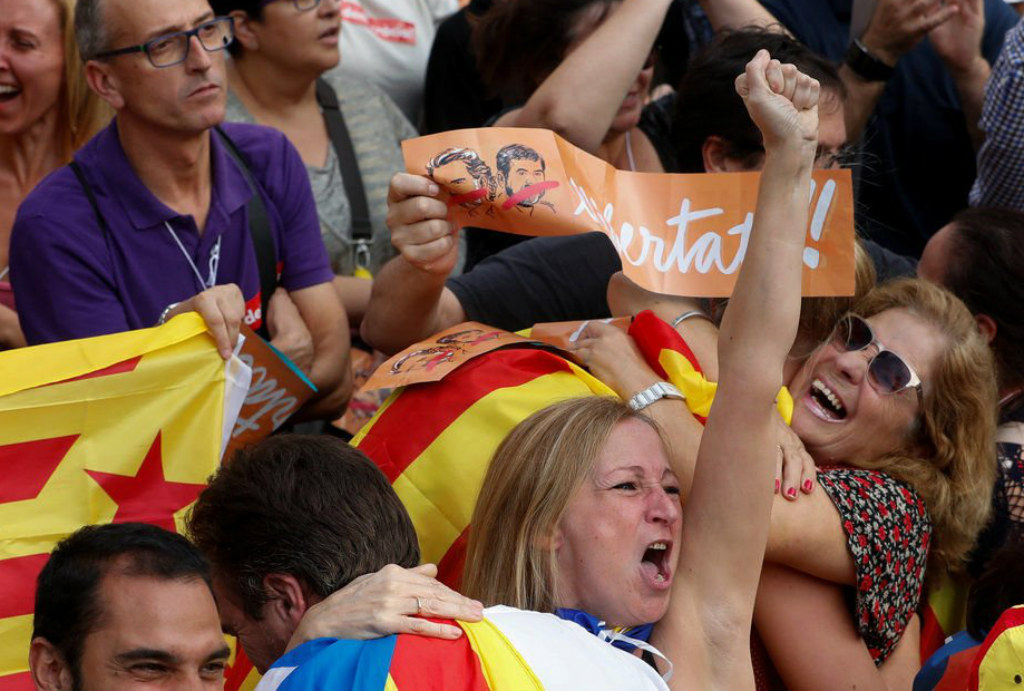Catalan crisis: did Russian hackers fuel separatism?
Fake social media accounts allegedly spread propaganda to stoke Spanish independence row

A free daily email with the biggest news stories of the day – and the best features from TheWeek.com
You are now subscribed
Your newsletter sign-up was successful
Spain’s struggle with Catalan separatists may have been exacerbated by Russian hackers engaged in a propaganda effort to divide Europe, it was reported yesterday.
The Spanish government-backed Elcano Royal Institute, in Madrid, says that unidentified Russian “troll” accounts spread inflamatory messages and claims - some true, some false - on social media in the run-up to the 1 October independence referendum.
“Russia has a nationalist agenda, and it supports nationalist, populist movements in Europe because that serves to divide Europe,” senior analyst Mira Milosevich told Bloomberg.
The Week
Escape your echo chamber. Get the facts behind the news, plus analysis from multiple perspectives.

Sign up for The Week's Free Newsletters
From our morning news briefing to a weekly Good News Newsletter, get the best of The Week delivered directly to your inbox.
From our morning news briefing to a weekly Good News Newsletter, get the best of The Week delivered directly to your inbox.
The Kremlin has used the Catalan crisis “to deepen divisions within Europe and consolidate its international influence”, Spanish newspaper El Pais reported in late September, days before the vote.
According to the paper, an influential tweet about the referendum posted by WikiLeaks founder Julian Assange - still languishing in Equator’s London embassy - went viral as a result of activity on fake social media accounts.
“We’re seeing foreign actors gain more of a voice in elections that are important to their interests,” Ben Nimmo, a senior fellow at the Atlantic Council think tank, told Politico shortly before the Spanish vote.
El Pais also claims that Russian news outlet RT used its Spanish-language portal “to spread stories on the Catalan crisis with a bias against constitutional legality”.
A free daily email with the biggest news stories of the day – and the best features from TheWeek.com
However, Spain’s ambassador to Russia told RT in October that Spain endorsed Russia’s stance and that the two nations enjoy “great relations”.
-
 6 exquisite homes with vast acreage
6 exquisite homes with vast acreageFeature Featuring an off-the-grid contemporary home in New Mexico and lakefront farmhouse in Massachusetts
-
 Film reviews: ‘Wuthering Heights,’ ‘Good Luck, Have Fun, Don’t Die,’ and ‘Sirat’
Film reviews: ‘Wuthering Heights,’ ‘Good Luck, Have Fun, Don’t Die,’ and ‘Sirat’Feature An inconvenient love torments a would-be couple, a gonzo time traveler seeks to save humanity from AI, and a father’s desperate search goes deeply sideways
-
 Political cartoons for February 16
Political cartoons for February 16Cartoons Monday’s political cartoons include President's Day, a valentine from the Epstein files, and more
-
 Epstein files topple law CEO, roil UK government
Epstein files topple law CEO, roil UK governmentSpeed Read Peter Mandelson, Britain’s former ambassador to the US, is caught up in the scandal
-
 Iran and US prepare to meet after skirmishes
Iran and US prepare to meet after skirmishesSpeed Read The incident comes amid heightened tensions in the Middle East
-
 Israel retrieves final hostage’s body from Gaza
Israel retrieves final hostage’s body from GazaSpeed Read The 24-year-old police officer was killed during the initial Hamas attack
-
 China’s Xi targets top general in growing purge
China’s Xi targets top general in growing purgeSpeed Read Zhang Youxia is being investigated over ‘grave violations’ of the law
-
 Panama and Canada are negotiating over a crucial copper mine
Panama and Canada are negotiating over a crucial copper mineIn the Spotlight Panama is set to make a final decision on the mine this summer
-
 Why Greenland’s natural resources are nearly impossible to mine
Why Greenland’s natural resources are nearly impossible to mineThe Explainer The country’s natural landscape makes the task extremely difficult
-
 Iran cuts internet as protests escalate
Iran cuts internet as protests escalateSpeed Reada Government buildings across the country have been set on fire
-
 US nabs ‘shadow’ tanker claimed by Russia
US nabs ‘shadow’ tanker claimed by RussiaSpeed Read The ship was one of two vessels seized by the US military